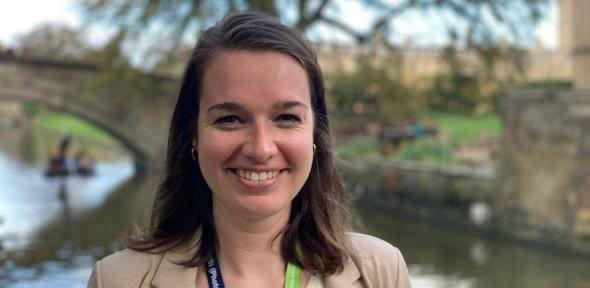
Interview with Darwin College
Could you tell us a bit about the focus of your research?
So I’m a chemist, first of all! And I focus on artificial photosynthesis. Basically, we’re trying to learn from nature where, for example, leaves on plants use sunlight to convert simple molecules like carbon dioxide and water into the building blocks of life.
Photosynthesis is perhaps the one process that even people who didn’t go very far with science remember from school.
Yes! And we’re trying to emulate that process, to find solutions and alternatives for what we now use fossil fuels for. To see if we can make, for example, solar fuels, where we don’t have the emissions of carbon dioxide. I am particularly looking into if we can also use the same kind of chemistry to not produce simple fuels, but more complex molecules like the building blocks for medicines.
It’s a bit of a stretch, it’s a new direction in artificial photosynthesis research, but it’s very exciting.
Wow! So how would that work?
So what we’re trying to do within artificial photosynthesis is we use light to break and make new chemical bonds. That works with very simple molecules like hydrogen – you just have to bring together electrons and protons. Now the big question is if we can also use the same principle to make more complex molecules. In principle it should work but of course it’s way more complicated. The devices I work on are called biohybrid devices, so we have synthetic parts as well as biological parts.
I was very happy that I could join this research group because they’re really leading in the whole field – there are so many different things being done and I really like that.
That’s extraordinary that you can take it in so many different channels.
Yes, I think that’s the beauty of chemistry. That’s what I really like about chemistry, that with the same principles you can get anything you want.
And how did you start? Were you always very science-focused in school or how did your pathway come about?
I was always very interested in the natural sciences but I first thought I wanted to study biology, because I really liked studying how cells operate. There were all these complex cascades of reactions going on, it really amazed me. But then in the end I found out that I actually really liked the chemistry behind that. I did a small project in high school where I made my first molecule and I was sold straight away. It was a very simple molecule but I just loved it.
Was there a stage in your studies when you realised that you wanted to carry on learning and researching?
Yes, during my first internship. At the University of Amsterdam, in your second year you do these four-week internships in a real research group. I loved being in the lab. I learned that you can use your fascination for a molecular bond to solve these important problems, like the energy crisis. And that was really the moment that showed me, ‘oh this is wonderful actually.’ Then I really wanted to become a researcher, to try to have an academic career.
Have you felt at a disadvantage at any point, as a woman in science?
It’s really interesting; during my high school there was a specific programme encouraging girls to choose natural sciences subjects. It worked really well – I remember that I actually had a physics class with 25 girls and five boys. So I never felt that this is not a place where I should be. But now I’m at a later stage in my career I can really see for the first time that there is a difference in numbers. So I think it’s really important that people keep on investing in these kind of programmes, because I think they really work.

